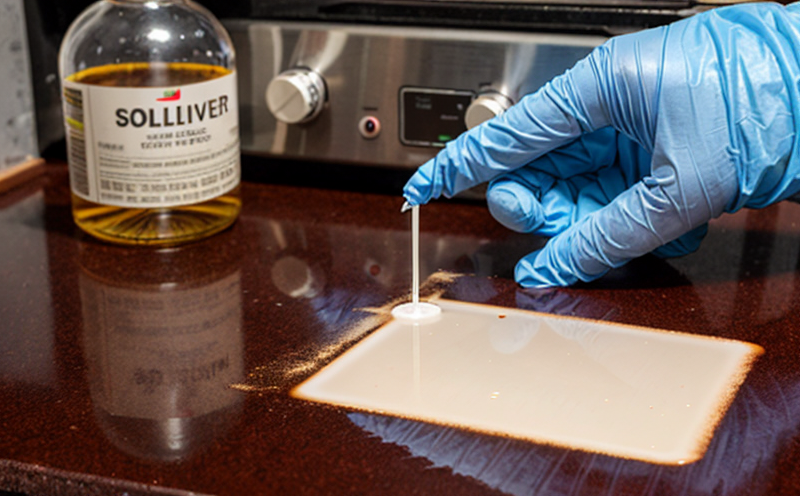Aviation Fuel Solvent Residue Testing
In the aviation industry, fuel quality is paramount to ensure safe and efficient flight operations. Aviation fuel, specifically Jet A-1, undergoes rigorous testing before being approved for use in aircraft engines. One critical aspect of this testing involves the assessment of solvent residues present within the fuel.
Solvent residue refers to any volatile organic compounds (VOCs) that may remain after the distillation process during fuel production. These residues can affect the performance and lifespan of aircraft engines if not controlled properly. The presence of excessive solvent residues could lead to operational inefficiencies, increased maintenance costs, and even pose a safety risk.
Our laboratory provides comprehensive aviation fuel solvent residue testing services tailored specifically for Jet A-1 fuels used in commercial and military aviation sectors. Our approach ensures that the results are accurate, reliable, and compliant with international standards.
The testing process begins with the collection of a representative sample from the batch of fuel to be analyzed. The sample is then prepared according to industry best practices before being subjected to various analytical techniques. These methods include gas chromatography-mass spectrometry (GC-MS), which allows for precise identification and quantification of solvent residues.
Our team uses state-of-the-art equipment calibrated against recognized reference materials to ensure consistent and repeatable results. Following analysis, we provide detailed reports summarizing the findings along with recommendations if any non-compliance is detected.
Compliance with relevant standards such as ASTM D1652-18 or ISO 4309:2017 ensures that our clients meet regulatory requirements set forth by aviation authorities worldwide. By partnering with us, organizations can maintain confidence in their fuel supply chain while minimizing potential risks associated with substandard products.
Understanding the importance of this service, we offer additional support services including training sessions for personnel responsible for quality assurance activities related to jet fuels. This helps foster an environment where continuous improvement is encouraged throughout the entire lifecycle of aviation fuel production and distribution processes.
Applied Standards
| Standard Name | Description |
|---|---|
| ASTM D1652-18 | This standard specifies the procedure for determining the amount of residual solvents in aviation turbine fuels. |
| ISO 4309:2017 | An international standard detailing methods for identifying and quantifying volatile organic compounds in aviation fuel. |
Industry Applications
- Airline operators aiming to comply with strict regulations governing the use of jet fuels.
- Military organizations responsible for maintaining high standards in fuel quality for operational readiness.
- Refineries involved in producing aviation turbine fuels seeking assurance about their product's compliance levels.
- Aviation maintenance facilities requiring regular testing to ensure they are working with compliant fuel sources.
Environmental and Sustainability Contributions
By ensuring that aviation fuels meet strict solvent residue limits, we contribute positively towards environmental protection efforts. Excessive solvent residues can lead to increased emissions which have adverse effects on air quality. Our testing supports the development of cleaner burning jet engines by helping manufacturers identify areas for improvement early in the design stage.
Furthermore, this service plays a crucial role in promoting sustainable practices within the aviation sector. It encourages responsible resource management practices that minimize waste generation and reduce overall environmental impact throughout the fuel lifecycle from extraction to disposal.





